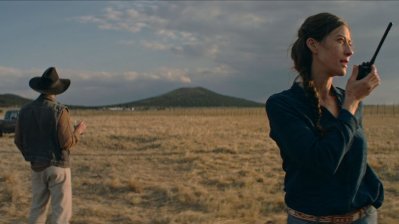Our Time / Carlos Reygadas / 2018 / 
Active Ingredients: Beautiful natural cinematography
Side Effects: Obsessive, circular emotions

[Our Time plays this April at Boston MFA’s New Cinema from Mexico festival.]
With Our Time, Mexican auteur Carlos Reygadas combines themes and visual elements of his previous two features (2007’s Silent Light and 2012’s Post Tenebras Lux) into a quiet, slowly-unfolding rumination on love, jealousy and individuality within a relationship. Starring the director himself, his wife and film editor Natalia López, and their children, the film plays as a strange mix of self-serving and self-immolating, wading through messy emotions that feel cathartic for the director and claustrophobic and obsessive for the audience.
Reygadas plays Juan, a rancher and successful poet who spirals into self-destructive jealousy when his wife Ester takes advantage of their open relationship. Juan practically pushes Ester into the arms of other men, then obsessives over the results, driving the couple further and further apart. Juan needs to feel control, while Ester longs to be her own person, to have her own thoughts and experiences that her husband can neither initiate nor oversee. At a certain point, however, the emotional fallout of this dysfunctional arrangement stagnates and both Juan and Our Time circle the same themes instead of digging deeper. And even though Ester realizes her need for self-realization, the film itself unfortunately doesn’t attempt to give it to her, limiting her to a catalyst for Juan’s own feelings.
I’ve struggled with all three of Reygadas’s recent films, as captivated by their visual beauty as I am baffled and unmoved by their elemental themes and deliberate style. Silent Light deals with similar themes of infidelity and Post Tenebras Lux employed a similar visual approach, but all three feel at once blunt and opaque. Especially with his last two films, Reygadas often employs wide angle lenses, natural light and an improvisatory feel to capture the power and beauty of nature. This strain of Reygadas’s cinema can be engaging and dynamic, as in the opening of Our Time, where he fluidly establishes the community of people living and working on a ranch that raises bulls for bullfighting (a symbol of Juan’s bullheadedness).
But just as frequently Reygadas uses static long takes as deliberate as they are arbitrary. I’m not sure, for example, why an extended shot of a plane descending is chosen to accompany a letter being read on the soundtrack, or why an exterior of Juan and Ester’s home belongs with narration explaining the emotions that the visuals themselves should convey. Presumably this approach is to allow the audience to live and breathe with the characters in a particular moment, but the effect can be isolating and trying over the film’s three hour run-time.
Reygadas’s films are prickly, but their originality and visual beauty make them unique experiences, and Our Time represents the director at his most naked and humane.


